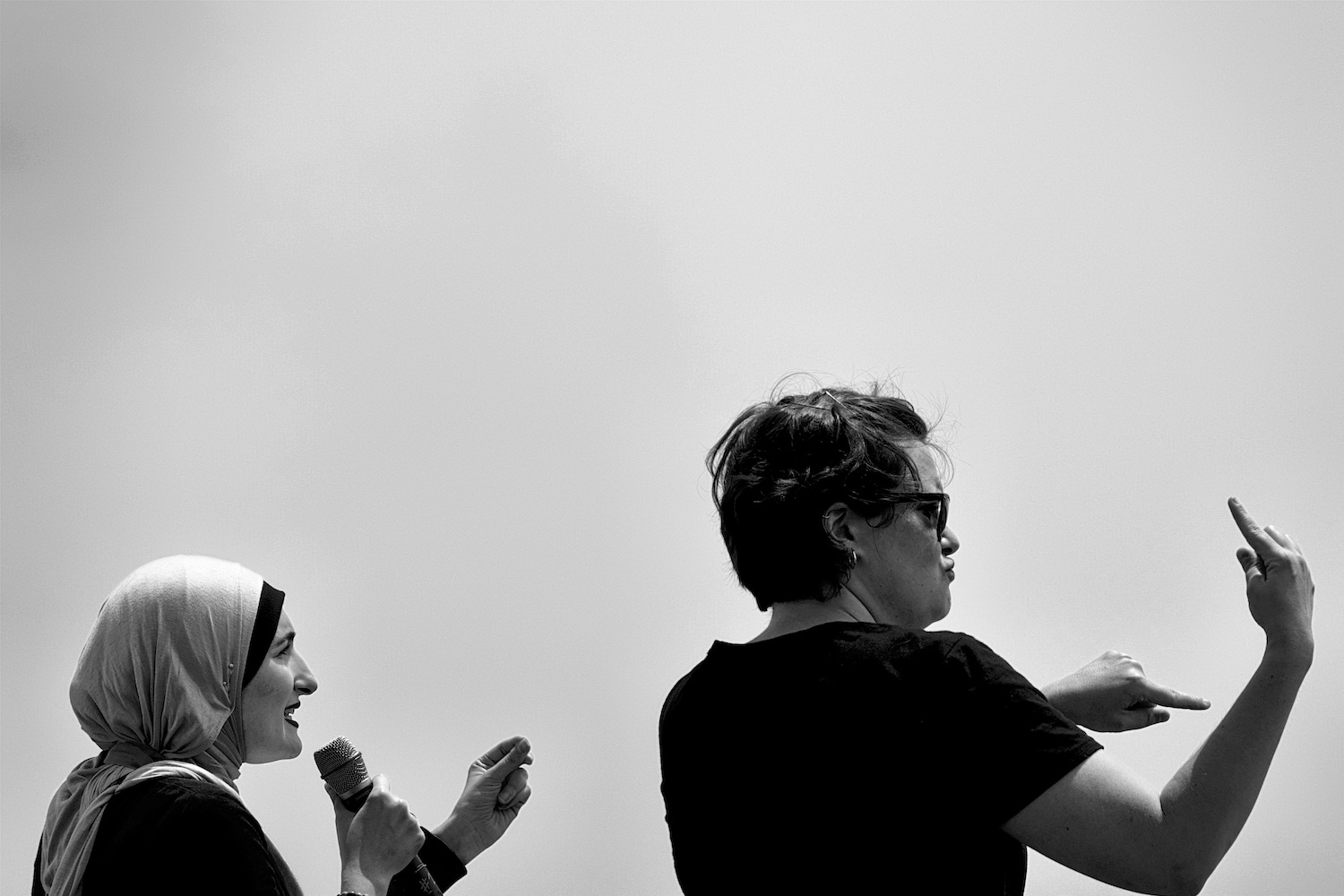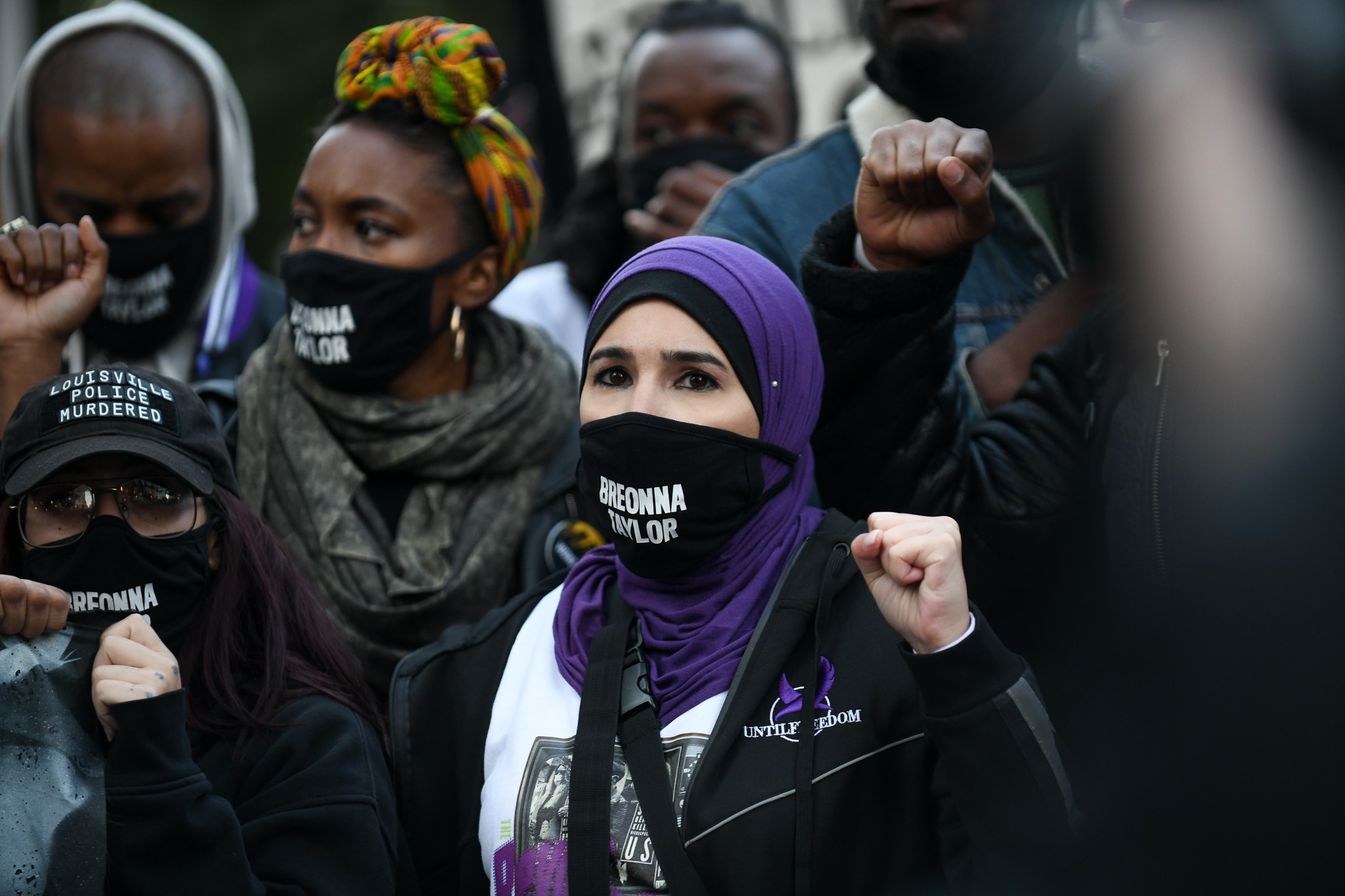Linda Sarsour, one of the most prominent Muslim activists in America, is not exactly jumping for joy at the prospect of a Joe Biden presidency. Biden represents everything that Sarsour does not: old, white, male, centrist, Zionist.
Nonetheless, the Palestinian-American activist and former Bernie Sanders campaign surrogate is mobilizing the communities she comes from to vote for Biden and against Donald Trump. For Sarsour, Biden is the opponent she wants in the White House. Trump is too much of a “fascist” to be moved, she says, while Biden could potentially be responsive to a progressive movement that would put pressure on him.
Much of the Muslim American and Arab American communities agree with her, their distrust of Biden’s foreign policy positions notwithstanding. According to a new poll by the Arab American Institute, 59 percent of Arab Americans say they are voting for Biden, while 35 percent are backing Trump. Meanwhile, 71 percent of Muslim Americans back Biden, according to a Council on American-Islamic Relations survey. Their votes could be decisive in some battleground states such as Michigan, where over 200,000 people trace their roots back to the Middle East.
Less than a week out from Election Day, Sarsour — who spent her late summer and fall in Louisville, Kentucky organizing residents pushing for change in the aftermath of the police killing of Breonna Taylor — is currently touring the country to make sure those communities and the broader progressive left come out to vote and make good on what they are telling pollsters.
I spoke with Sarsour, a former leader of the Women’s March and the head of Muslim American group MPower Change, about her thoughts on the election, Palestine, police brutality, the movement for Black lives, and the state of the progressive movement.

This conversation has been edited for length and clarity.
What are you doing in the run up to the election? Both you and the organization, MPower Change, you run?
I’m doing two parallel things that intersect. I’m the leader of the My Muslim Vote Campaign, which specifically targets Muslim voters in key states, including Wisconsin, Ohio, Michigan, Pennsylvania, Florida, Texas, and North Carolina. We put out six multilingual, one-minute videos. They explain how people can obtain their vote-by-mail ballot, in Urdu, Somali, Bangla, Arabic, English of course, and Farsi. Those are the languages we use because we know that a lot of Muslim Americans have not been part of our organizing, and have never really been part of our organizing electorally, to do vote-by-mail.
I’m [also] part of a group in Kentucky called Until Freedom. We have a “State of Emergency tour” [to mobilize voter turnout], and it’s going to go to nine states, including Alabama, Georgia, Florida, North Carolina, Pennsylvania, and Michigan. We’ll be gone from October 22 all the way until Election Day.
What’s your sense of how mobilized the Muslim American community is and where that support is going in terms of candidates? I mean, I would imagine that most support is for Biden.
Our Muslim American community is unfortunately voting right now from a place of stopping harm. The sentiment is that Donald Trump has caused even more harm than communities have seen even prior to him.
But the Muslim American community cannot deny that under the Trump administration those things have been exacerbated, including the Muslim ban. And the Muslim ban, for our community, is so in your face and so directly impacting because we have families who are separated from one another. [This has] sent the message to our community that if Trump gets four more years, that [banned] country list may expand and may include other Muslim-majority countries, like North African countries.

What is [also] motivating the community to vote is that they got a public confirmation from the Joe Biden campaign. Biden said this publicly on the record, not just to the Muslim community in a meeting. He said that one of his top priorities on Day One of his administration is to repeal the Muslim ban. That ban may not necessarily impact the three to five million Muslims who live in America, but it impacts a significant portion of our community. That’s why the Muslim community feels like their vote may be worth it in this instance.
And Trump — you know the separation of families at the border, and the increased deportations that have impacted our community. The community is not excited. They’re not enthusiastic. But they know that they have to do the right thing, and the right thing might not always be the thing that you wanted, but you know you have to do it.
How do you think the Biden campaign has handled outreach to Muslim Americans, who are an important voter bloc for the Democratic Party? Obviously, they didn’t make you too happy around the Democratic National Convention, when they criticized you after you appeared at a DNC event. What’s your assessment of how they have done their outreach to Muslim Americans writ large?
As you mentioned, there was a situation around the convention that included me, but really it was bigger than me. It was a signal to the larger Muslim American and Arab American communities.
It kind of raised my credibility amongst progressives and leftists, and amongst the communities that I come from. I never worked for the Biden campaign, nor did I want to work for them. So in order for me to continue to have credibility — to mobilize my community — there has to be a confirmation somewhere that I didn’t go from Bernie to Biden, which somebody might have thought. You know how people are, they might have been like, “Well, maybe Linda’s getting paid by the campaign. Why is Linda telling people to vote for Biden?” So actually, for me, that was a good move on the part of the campaign to say that I had no affiliation with it.
But it still signaled to the community that the campaign did not agree with the views that I hold, which are the views held by a majority of the community that I come from. Supporting BDS [the Boycott, Divestment and Sanctions movement] is not a marginalized position in the Muslim or Arab American communities. Nor is our critique of the right-wing pro-Israel lobby in America. Nor is our vehement critique of the State of Israel, the occupation, and settlements. All of the positions that I hold are mainstream positions in my community.
So that was a big, big mistake that the Biden campaign made. And they never really made it better. They never really walked it back in public. That became a problem as well, and something that we have to overcome.
That’s why my voice was important to continue to mobilize in this election. Because the people in my community are basically saying, “Look, if Linda Sarsour is mobilizing and telling us that we’ve got to vote, and she was personally attacked by the campaign, then she is credible in the situation and she is on to something.” That’s why I’ve been using it to say, “Look, I’m not a friend of Biden’s. I’m not going to have dinner with Biden once he becomes the president. He’s going to be my opponent in the White House.”

That’s the framing that I’ve been using as an individual in the larger Muslim American community, saying, “I can’t with fascists anymore. We’re not able to move forward fighting fascists. We’re putting all of our energy on being reactionary and not able to actually move policies or our movements forward. So let’s get a better opponent, and our better opponent is Biden.” That argument has been working better in our community.
The problem with the Biden campaign is that they don’t understand our community’s political dynamics nor our power mapping. They don’t actually know — and you can tell by their outreach — who in fact can mobilize Muslim Americans, who are the most powerful organizations with membership, that have chapters across the country, that own brick and mortar around the country, that are able to bring people to the table. They don’t have Muslim grassroots organizers at a high level in the campaign that would have been able to show them how the dynamics work, and who in the community actually is the most influential when it comes to electoral work.
What are you expecting, predicting, if Biden wins the election? What will be the most important battles between people like yourself and the White House?
One is definitely going to be around policing in this country, and pushing the Biden administration to focus on criminal justice reform as a whole. Health care is going to be a big issue that we’re going to have to fight with the administration on, especially if we win back the Senate and are able to put together some sort of Medicare for All. Biden said if a Medicare bill came to his desk, he wouldn’t sign it. I doubt that this is true, because I think we’ll build a big enough movement around him that he’s going to be forced into it.
I do think that there will definitely be some fights around foreign policy issues. I don’t foresee that in the beginning of the administration — I don’t think Biden is focused on them yet, it doesn’t seem to be his main platform. But I do foresee him slipping up on issues around Iran, and around Palestine-Israel.
As someone who has been organizing on police brutality, what’s your assessment of where the Biden campaign is on that?
I feel like the Biden campaign is trying to have their cake and eat it too. There is a lot more calling of the names of Breonna Taylor and George Floyd, and trying to appeal to activists and folks who care about the sanctity of Black life. But I also hear [calls for] law and order. I can’t decipher exactly where this administration is on the issues of police brutality and accountability. The campaign right now is trying to cater to centrist voters and people who are pro-law enforcement. That’s why I think that’s going to be one of the biggest fights.
Once you become the president of the United States, these movements are not going to do you like they did [Barack] Obama. They’re going to be in the street and they’re going to hold you accountable, because they remember that we made some mistakes under the Obama administration. We trusted that Obama was a constitutional lawyer. He was an organizer from the Southside of Chicago. He was Black. And we really believed that we had made history, which we did, and that Obama was going to go in and do the right thing.
But he cannot do the right thing without people in the street and without a strong, mobilized movement that holds him accountable. He, unfortunately, was surrounded by lots of neoliberals and old, traditional Democrats. And he didn’t, in fact, do all the things that I believe he wanted to do, because we kind of left him out by himself. I think this time around, the movement is ready to fight and ready to organize and mobilize regardless of who’s in the White House. Whether Biden goes in or Trump goes again, we’re still going to be out in the streets.
What’s your greatest fear about both the election and the aftermath?
I have two fears. One fear is that Trump does not concede power and that we don’t win by a large margin, which then gets us to a place where [the election] will be contested and challenged in court. As you know, Trump has appointed [220] judges across the country; that’s in addition to whatever conservative judges already sat on benches in different states. If he challenges us and it gets up to the Supreme Court, the court right now is not made for marginalized people. Nor is it set up to defend democracy, because the majority right now are conservative, the latest being appointed by the Trump administration.

The other worry that I have is that if Biden wins, all the white allies that have been activated over the last four years might think that Biden being elected makes their job done, and that people will see the Biden administration as a milestone by defeating a horrific presidency — [that] now, they can kind of get back to business as usual. It worries me because we have so much more fighting to do, and the frontline organizers who’ve been on the streets — particularly the many people of color and women of color — are trying to expand the base of the movement. So, I’m worried that some of the folks who’ve been mobilized in the last four years may, in fact, go home. That’s very concerning to me.
What do you think needs to be done to stop that from happening?
I’ve been having these conversations with a lot of groups like the DSA [Democratic Socialists of America] folks, Indivisible, and others about how we maintain the memberships that accumulated over the last four years. I think a lot of these groups are doing the work, continuing to get commitments from people beyond this election, getting people to stay focused with the idea that there are local elections that are coming up in 2021, and 2022, and 2023, and 2024. Getting people to build up toward 2024 where we hope that there may be a progressive challenger, if it’s Biden who goes up again, which I doubt, or if it’s Kamala [Harris].
[We should] prepare the progressive movement to run a progressive challenger, and getting more progressives in Congress across the country. We’ve seen every election — 2018, 2020, and now we hope 2022 — bring more people of color and more progressives to run for Congress. So, the work is being done. And I believe in these allied groups who really are continuing to hone this message. But I feel in my little heart as a frontline organizer, I’m still worried about it. We have to wait and see. I trust my allies that they’re doing whatever work is necessary to maintain their membership.
We’re in the midst of a crushingly depressive pandemic, and obviously, a far-right administration bent on bulldozing over human rights and social justice. But do you find hope in these days before the election?
Moving to Louisville is the hope that I needed in order to even get through this election. I’m a local organizer. I come from local neighborhoods, and that’s where I like to organize.
They’re hopeful times for me because I’ve gotten to see the evolution of some of these frontline activists. I’ve been watching young people that I’ve trained in nonviolent direct action and de-escalation, giving them tools and skills so that when we eventually leave Louisville, we would have left something behind.
Young Black people and young people of color are not the future — they are the right now. I see a different kind of analysis amongst this generation. This is a generation that’s going to hire you and fire you in elections. They have no loyalty to elected officials. I have watched them talking to their own elected officials, and it’s very inspiring. There are no backdoor deals. They’re just a generation that says, “Here’s what we know we need, and nothing less than justice. And we’re going to keep fighting until we get justice.”


